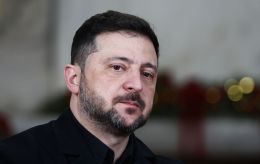Estonia seeks mechanisms for deporting those accepting Russian citizenship
 Photo: Prime Minister of Estonia Kaja Kallas (Getty Images)
Photo: Prime Minister of Estonia Kaja Kallas (Getty Images)
The Estonian government is exploring legal mechanisms for the deportation of individuals who wish to acquire Russian citizenship, according to statements by Prime Minister Kaya Kallas, writes Postimees.
Russia seeks to undermine Estonia's security
Kallas recalled that the Russian Federation has violated all principles of international law by attacking the state and people of Ukraine. The Estonian Parliament and the Council of Europe have recognized the Russian regime as supporting terrorism, and Russia itself as a state supporting terrorism.
In this context, it is necessary to consider other aspects of how the Russian Federation seeks to undermine the security of Estonia and its allies, according to Kallas. She mentioned Russia's practice of attacks on Baltic countries during military exercises, spreading hostile and false narratives about Western countries through official channels, and organizing the entry of illegal migrants into the European Union.
Those who obtain a Russian passport may be mobilized
Kallas expressed the view that when a person who has lived in Estonia for a long time, through independent media, has had the opportunity to gain a true understanding of Russia's attacks on Ukraine and the attitude of the free, democratic world toward Russia's attacks on Ukraine, and yet voluntarily decides to acquire Russian citizenship, it is a clear signal that the Estonian state cannot ignore.
Moreover, Kallas stated that the fact that a person living in Estonia decides to obtain Russian citizenship at a time when Russia is attacking the Ukrainian state and people indicates that, if necessary, in the event of mobilization, they are ready to join the Russian army and participate in attacks on Ukraine.
This was deemed a threat to Estonia's security and a clear signal that the Estonian state cannot ignore.
Estonia has legal basis for deportation
Kallas reminded that Estonia is a democratic country, and the annulment of the residence permit for a long-term resident is carried out according to Article 241 of the Foreigners Act, which stipulates that the residence permit of a long-term resident may be annulled if the foreigner poses a threat to public order and national security.
Therefore, each procedure is individual and based on an assessment of the specific individual's danger. In a situation where obtaining Russian citizenship by a person is a clear signal of support for terrorism and actions of the Russian Federation against Estonia and its allies, it is necessary to consider the suitability of this person to live in a democratic country that adheres to human rights, added Kallas.
The Prime Minister also confirmed that the statement by the Minister of the Interior, Lauri Läänemets, regarding the search for a way to deport those who decide to acquire Russian citizenship, is the official position of the government.
Background
Earlier, Läänemets reported that Russia wants to issue its passports in Estonia to former USSR citizens, attempting to mobilize additional people for the war against Ukraine. He added that those considering Russian citizenship must understand that it is not only an expression of views but will also have very clear and legal consequences. Last summer, it was reported that Estonia would be able to revoke citizenship for participating in the war against Ukraine

